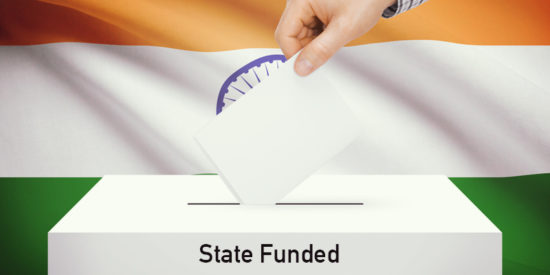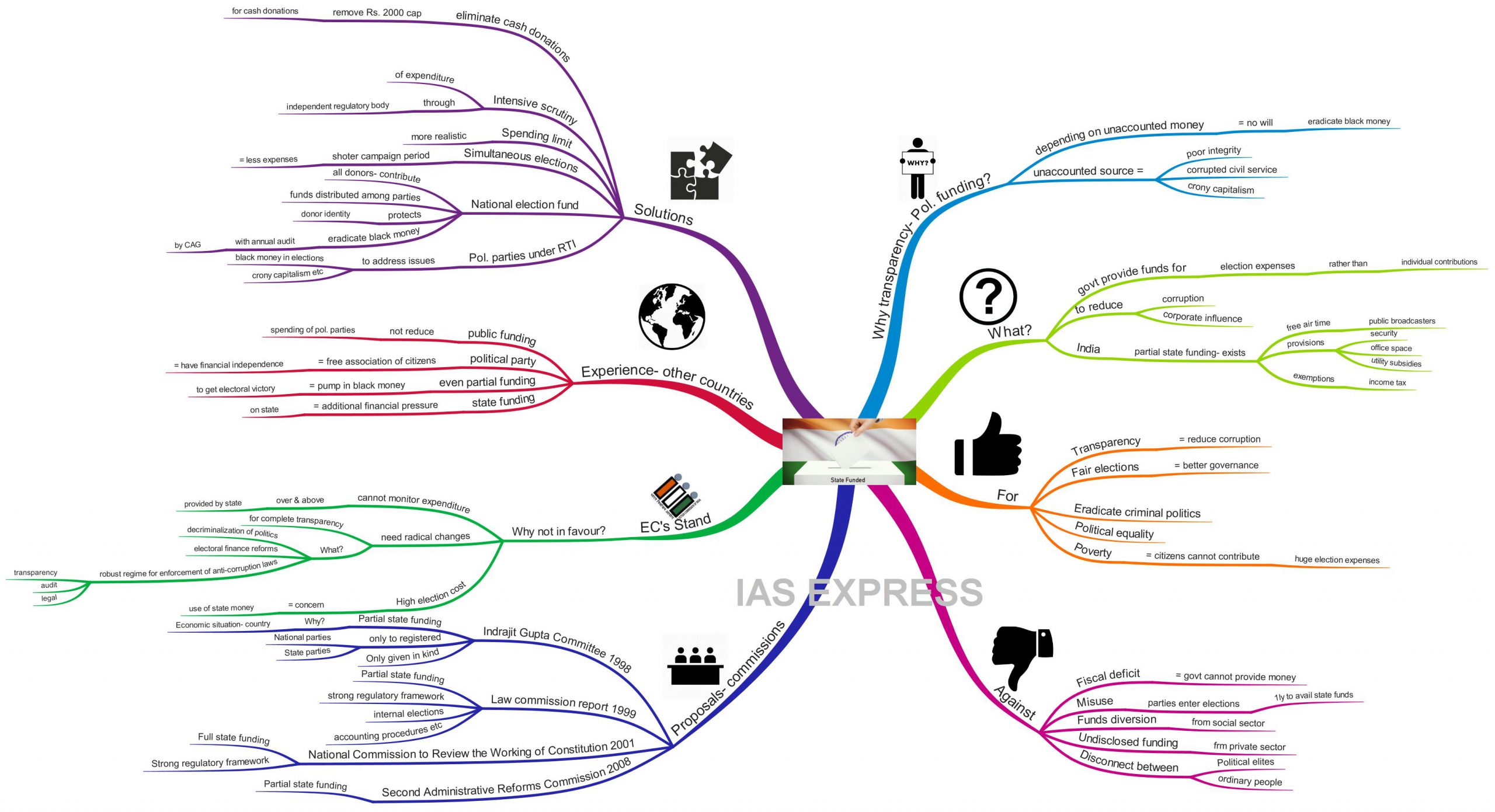State Funding of Elections in India – Need, Advantages & Disadvantages

From Current Affairs Notes for UPSC » Editorials & In-depths » This topic
IAS EXPRESS Vs UPSC Prelims 2024: 85+ questions reflected
Indian elections cost huge sums of money. This money hardly comes from contributions by sympathizers of the political party but from big corporate houses. Such contributions have largely come from undeclared income/black money and this increases corruption in the electoral process. It highlights the need for implementing effective reforms in electoral finance.
In the previous article, we have discussed the Electoral Bonds Scheme for bringing transparency in electoral finance. In this article, we are going to discuss another such reform called State funding of elections as a measure to bring transparency and eliminate corruption in the electoral process.
What is the need for bringing transparency in political funding?
- As long as Indian politics is highly dependent on unaccounted money for its finances, there can be no decisive political will to eliminate black money.
- Political parties spend huge amounts in election times however they report their income as only a fraction of what they spend. It is because the bulk of their spending is financed by unaccounted income = affected the integrity of governance, corrupted the civil service and promoted crony capitalism in the country.
- All these problems can be solved only if the sources of political funding are made fully transparent.
What is State or Public Funding of elections?
- It means that the government would provide funds to the candidates for contesting elections and meeting other election-related expenses instead of individual campaign contributions.
- It is meant to reduce corruption and undue corporate influence on politicians.
- It has to be noted that, there is already some sort of state funding exists in India. For example, free air time on public broadcasters, the provision of security, office space, utility subsidies and most importantly the exemption of registered parties in India from paying income tax under Section 13A of the Income Tax Act.
What are the arguments in favour of state funding of elections?
- Transparency: Many recommend that state funding is the best possible way for achieving transparency and reduce corruption in the electoral process.
- Fair elections: As funds are equitably distributed among the parties by the government, it will bring a level playing field for new/growing parties on par with the established parties, thus ensuring fair elections.
- Better Governance: Candidates who are elected through a fair electoral process would be transparent and accountable in providing governance.
- Eliminate criminal politics: Candidates take up Criminal activities mainly to generate a huge amount of money for funding the elections. If elections doesn’t require money from individuals = no need for criminal activities.
- Political equality: state funding ensures that certain powerful groups or individuals do not exercise undue influence in the electoral processes.
- Poverty: In societies where most citizens are under or just above the poverty line = they cannot be expected to donate huge sums to political parties or candidates. Therefore if the latter receive at least a basic amount of money from the State = the country could have a multi-party system without people having to give up their scarce resources.
What are the arguments against state funding?
- Fiscal deficit: Many experts who are against the state funding idea wonder how a government that is dealing with deficit budgets, can provide money to political parties for contesting elections. Notably, India collects only around 16% of GDP as the tax.
- Misuse: State funding may encourage every outfit to enter the political arena just to avail the state funds instead of aiming to win elections and undertake welfare activities.
- Diversion of funds from Social objectives: Considering that the state expenditure on key social sectors such as primary healthcare is really small = government providing money to political parties is a revolting idea.
- Undisclosed funding: State funding of elections will not stop parties from lobbying and getting undisclosed additional funds from the private sector.
- Disconnect with people: State funding would only increase the distance between political elites (party leaders, candidates) and ordinary people (party members, supporters, voters).
Hence State Funding is not the panacea for opaque funding of politics in India.
What were the proposals of various commissions?
Some major reports on state funding include those given by:
- Indrajit Gupta Committee on State Funding of Elections (1998),
- Law Commission Report on Reform of the Electoral Laws (1999),
- National Commission to Review the Working of the Constitution (2001) and
- The Second Administrative Reforms Commission (2008).
Except for the 2001 report, all other committees recommended partial state funding only in view of the economic situation of the country.
The 1998 report mentioned that state funds should be provided only to registered national and state parties and that it should be given only in kind.
The 1999 report supported the above point and also suggested implementing a strong regulatory framework, internal elections, accounting procedures, etc.
The 2001 report also concurred with implementing a regulatory framework before thinking about state funding.
What is the Election Commission’s stand?
Election Commission is not in favour of state funding due to the following reasons:
- Cannot monitor expenditures: EC will not be able to prohibit or check expenditures over and above which is provided by the state.
- Radical changes needed: For complete transparency, there have to be radical changes in the provisions with respect to receipt of funds by political parties, and the manner in which such funds are spent by them.
- High election cost: Considering the high cost of election campaigning in terms of media advertisements and public rallies, the use of state money in politics is a major concern.
- The time is not yet ripe: to opt for public funding of elections unless radical reforms such as decriminalization of politics, holistic electoral finance reforms, robust transparency, audit and strict legal regime for enforcement of anti-corruption laws are implemented effectively.
What is the experience of other countries?
- Experience in democratic countries like Germany, France, Denmark, Israel, Italy, Finland, Australia, etc. has revealed that public funding does not necessarily reduce the spending of political parties.
- The major point against state funding in these nations is that a political party is a free association of citizens and therefore should have financial independence.
- Furthermore, even partial funding leaves a loophole for candidates to pump in black money to increase the chances of their victory. Thus the state funding is additional financial pressure on the state.
What are the solutions?
- Eliminate Cash donations: The cap of Rs 2000 for cash donations offers an opportunity for the flow of black money into elections. This should be eliminated altogether i.e., even Rs. 2000 should be paid through bonds or through online.
- Intensive scrutiny: of election expenditure incurred by parties and candidates is needed in order to ensure detection of black money in the system. An independent regulatory body could be established for this purpose.
- Expand spending limit: In India, the primary reason for the prevalence of black money in election spending is the unrealistically low limits fixed by the Election Commission of India on campaign expenditure by political parties and candidates. Therefore more realistic campaign spending limits should be set.
- Simultaneous elections: should be considered because a shorter campaign period will limit expenses incurred by parties.
- National Election Fund: as suggested by the former Chief Election Commissioner T.S. Krishnamurthy shall also be explored, to which all donors can contribute and the funds are distributed among the parties based on the votes they get or any other principle agreed by all parties. It will also protect the donors’ identity and wipe out black money with an annual audit by CAG.
- Parties under RTI: Bringing political parties under the ambit of Right to Information (RTI) Act will solve the issue of black money usage, crony capitalism, etc.
If you like this post, please share your feedback in the comments section below so that we will upload more posts like this.



The nest